
Kids are experiencing Covid-19 anxiety as well
Covid-19 is new for everyone
Things changed quickly when the Covid-19 “lock-downs” started. Some of us felt a bit unprepared as new realities like closed daycares and schools threw us into new realities very quickly. As the quarantines are starting to loosen, however, new changes are coming again. And many adults and kids are struggling with how things look when we emerge from our “quarantine headquarters” for the first time.
Some of us may have thought (or wished) that everything would just be back to normal. But the reality is that many things have been permanently affected by this pandemic. It can be very hard to explain to kids why the quarantine is over, but their favorite summer event is still cancelled, or the splash park is still closed.
This summer will be very different from what kids are used to. Besides this, they may be hearing things about a “second wave” and a possible “second lock-down” and they may be anxious and confused about the future. Because of active imaginations and not yet fully understanding societal structures and processes, kids may have an even harder time keeping anxiety in check and being able to rationalize their fears.
Even if we are ourselves struggling with similar anxieties and fears, we can help kids a lot with the way they feel about what is going on in the world. None of us have the perfect answer. But there are a few proven ways to lighten the emotional load. As parents, grandparents, family, and friends, we can provide support to our little ones during this time.

Get the facts first, then have an honest conversation about Covid-19
Before you give information about Covid-19 to kids, be sure that you’ve “vetted” the facts. Make sure they have come from a credible, impartial source. Information will only be helpful if it is accurate and in context. Having said that, it is important that we take a minute to manage our own anxieties before we sit and talk with kids. We don’t want to convey too much of our own anxieties in the process.
None of us are perfect and every one of us feels some stress and fear about this topic. But try to present the information as calmly as possible, as kids may follow your lead about how to react to it. Often, you’ll be surprised at how much even young kids have already picked up about a certain topic.
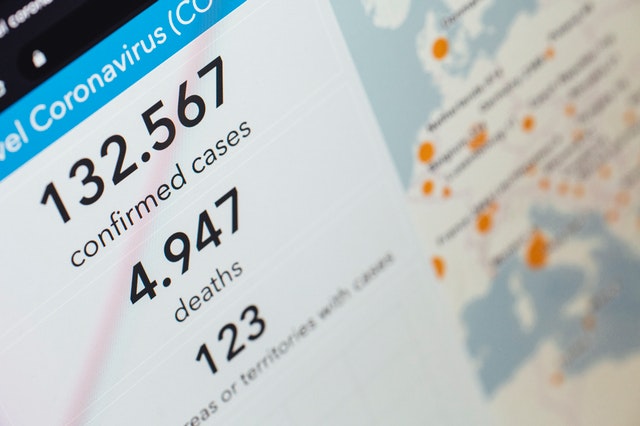
So, working with open ended questions can be a great approach. “What do you think the second wave means?” Then it’s helpful to correct anything they misunderstood and fill in the blanks of important things they missed. Especially when you’re talking with young kids, be sure to avoid big words and phrases like “social distancing or quarantine”. Use the simplest words instead, like “give space and stay home safely”.
If you’re talking with adolescents, teach them how to find their own credible and impartial sources of information about Covid-19.
“Don’t believe every worried thought you have. Worried thoughts are notoriously inaccurate.”
- Renee Jain
It might help them to find the context they need for the news they are inevitably exposed to. Although you won’t have as much control over what they see online, you can still be there and support them. They may also have questions you can help answer.

Help them feel in control
In a time of crisis, it often feels good to act, so that we don’t feel hopeless or aimless in the process. Talk to kids about things they can do to help during this time to shift the focus to something constructive. Maybe learn how to sew your own masks, or help organize food delivery for people who continue to be affected.
Turning idleness into action will help change the feeling from helplessness to contribution.
This can help kids feel like they are part of something bigger. And their actions are contributing to bettering their lives and the lives of those around them. Although they might still feel anxious or confused at times, they realize that they are helping make the situation better.

Have a routine tailored to Covid-19
When the quarantines became more widespread, our lives changed very quickly. Now, as the quarantines are being lifted, things are changing drastically again. Kids can rely on routine even more than adults to understand their lives. So, the drastic changes, or lack of routine without schools, friends and scheduled social activities can be extra hard on them.
Try and establish new routines even in the uncertainty to avoid aimlessness and confusion. Have breakfast together at the same time. Have a new time slot for some shared chores or an educational show. Or play their favorite games together on weeknights. It’s important that they can focus on familiar things coming up throughout their day or week.
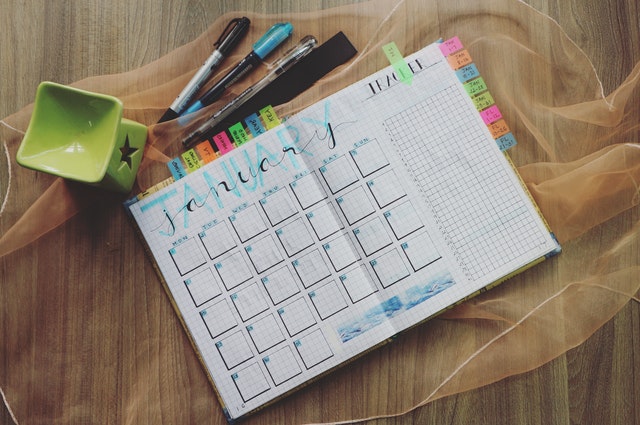
It might even be helpful to make them a little calendar you can stick on the wall or the fridge. If they are very little, the names of the days might not mean much to them. But they can see activities written for certain times every day. This will give them something to look forward to and expect.
For older kids, lots of educational material has been made available online. You can assign a designated time for them to explore the material and learn some new things. Staying active helps everyone from dwelling on the changes. Get creative with backyard games or even afternoon trail walks together, if you are allowed to head out.

Model healthy habits
Young kids especially rely on the adults around them to show them how things are done correctly. So, modeling healthy behaviors and habits in this time of adjustment can be the key to getting kids on board during Covid-19. Keep wearing your mask when you go out. Continue to show them how to wash their hands and not touch their faces.
Even self-care routines and de-stressing activities like deep breathing are wonderful to model for kids. They should learn early on how to keep themselves happy and healthy. If you’re telling kids about the importance of social distancing and then forget to do it when you’re out at the park, you teach kids that they don’t have to take the policy seriously. Consistency is the key to showing them how to keep themselves safe.
If you’re showing younger kids, don’t be afraid to stick a mask on their favorite stuffed animal. Or find a cute demonstrational video online to model the right behaviors. Getting creative always helps them stay engaged. Especially young kids tend to have an extremely short attention span. And you need to come up with interesting ideas to explain it in a way that makes sense to them.
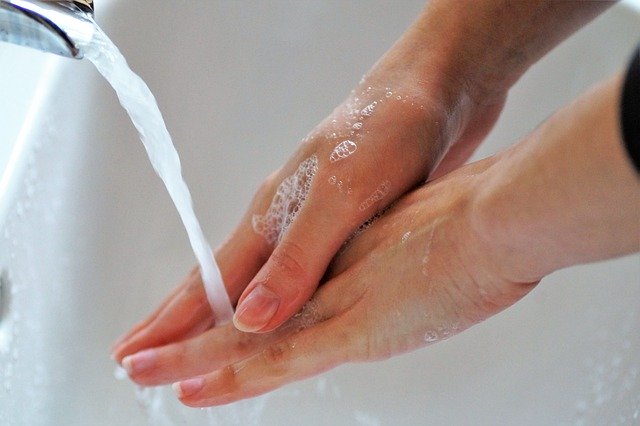
Modeling healthy habits also means giving them space to express themselves. This situation is new for them, so they might have concerns, questions, or might be scared and confused. Make sure you spend time answering questions and letting them tell you or show you what they are feeling. Acknowledging their emotions and working with them will be an important part of staying mentally healthy.

Stay connected during Covid-19
Obviously one of the points of social distancing is to create distance between one another. But physical distance doesn’t necessarily need to mean we don’t get to interact at all. Kids benefit from talking things through and even acting things out to work through concepts that are complex for their minds.
Talking with friends and family can be a helpful way of helping them deal with the situation. And stay emotionally connected to the people they love. Video calls have been a popular tool to help kids keep their social connections up. It can even be a great way to keep someone else, like a parent or grandparent, from feeling lonely.
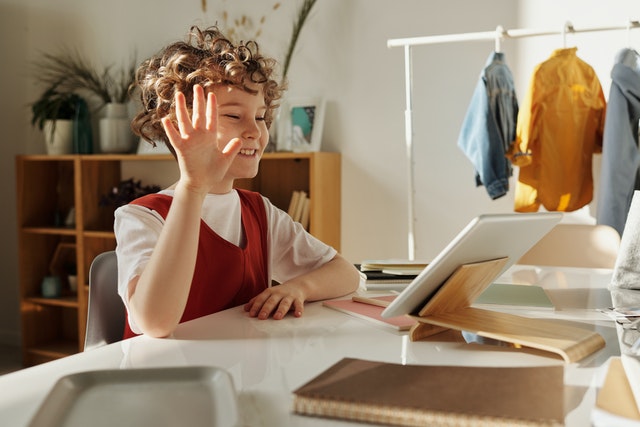
In fact, I have never met my niece in person. When she was born, we lived at the other end of the province and then ended up moving overseas. But that does not mean she doesn’t know me. Especially during quarantine, we have kept up the video calls and picture messages, to ensure we all stay connected. I know she doesn’t stay engaged for very long because she is very young. But she definitely looks forward to chatting for a few minutes and showing me all her favorite toys and drawings.
While online face-time can be helpful, be aware that computer time spent on social media and/or news can have the opposite effect after a while. Limit time on these platforms so kids don’t get overwhelmed with news and views about our situation. Often, they might run into a whole mess of negative news online they don’t understand. It’s best to keep an eye on what they do and who they talk to, to ensure the experience will be positive and enriching.

Offer comfort and extra attention
Like anyone during this time of adjustment, extra understanding, patience, love and attention is always helpful to give kids. Getting on eye level with them to give them undivided attention for whatever they may be up to can be a simple way to reassure them.
Often, as an adult, we feel we have to present kids with solutions to problems. But keep in mind that that’s not always true. Even just being truly present and listening and sympathizing with them can be exactly what they need. When they feel frustrated or agitated, remind them that everyone is just doing their best right now, and that it’s normal to feel stressed or confused.
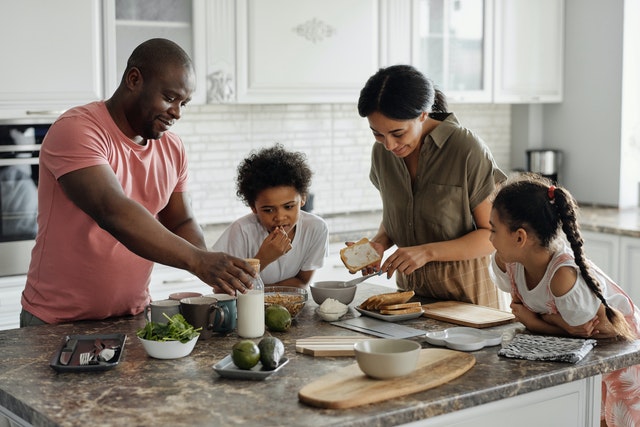
Keep the conversation open and continue to help them understand all the new changes coming every day. Help them focus on the positive things, like getting to spend more time with family and pets. Or having time to learn a new hobby even though they may be sad that their summer activity was cancelled.
Let them know that even though there is still much we are continuing to learn about this pandemic, we have many capable adults helping to manage all angles of it, so they don’t need to worry. There are lots of new policies in place to continue to keep everyone safe as the quarantine will be lifted.

The Takeaway
Most kids are having just as hard of a time with the pandemic as the adults. It’s even more difficult for them because they might be too young to understand why this is happening. Add the fact that you might be homeschooling for the first time ever and months at home together can become very trying indeed.
It’s a good idea to be as honest with your kids as is appropriate for their age level. They worry too and knowing what is going on will help them understand and deal with the situation better. Just make sure the information you give them is age appropriate. Create routines for them and include them in activities that will focus their minds on contribution, rather than anxiety and fear.
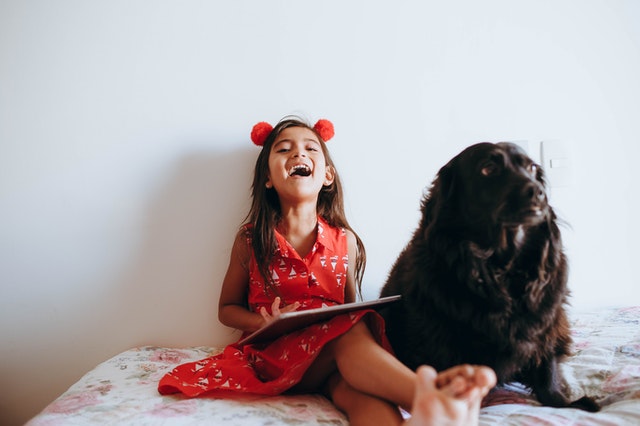
Model healthy habits for dealing with crises for them. And support their mental health by ensuring they stay connected with family and friends through messaging and video calls. Most of all, just be there for them. They will have questions and worries as well. It helps just to take some snuggle time or to listen to what they are feeling and being there for them.
The Covid-19 parent priority
This is definitely a time to become creative and find ways to address what your little ones need at this time. And even though your kids’ physical and mental health is priority, be sure you also take care of yourself. Parents are carrying the responsibilities of bread-winner, carer, teacher, nurse, entertainer, cleaner, cook, and much more during this time.
It is normal to get completely overwhelmed with this “new normal” during Covid-19 and feel anxious and exhausted yourself.
Nobody expects you to have all the answers. This is as new for you as it is for your kids. But, if you want to model healthy coping methods, you need to prioritize your own physical and mental health as well.
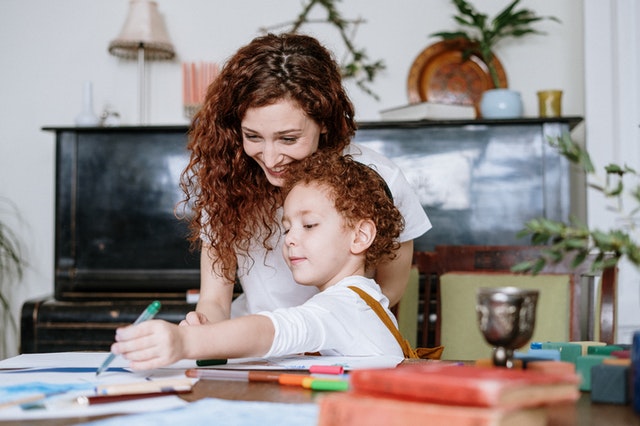
Be sure to get as much sleep as you can, eat healthy, and hydrate. Exercise helps combat anxiety and depression as well and you can even include your kids in some home exercises. Take just a few minutes each day for yourself to meditate, practice yoga, go for a walk or take a bath. And talk to your support network about how you are feeling.
You need to be mentally and physically healthy as well, so you can be there for your kids!
Sources
https://www.anxietycanada.com/articles/talking-to-kids-about-covid-19/
https://www.nami.org/Blogs/NAMI-Blog/March-2020/How-to-Ease-Children-s-Anxiety-About-COVID-19
